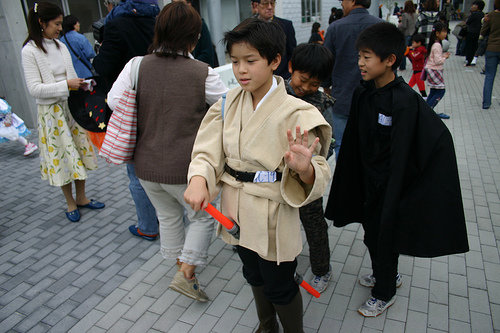Stereotypes are really not good, since they cause us to make assumptions about people from other countries before we’ve gotten to know them. When I taught English as a Second Language, I used to do a lot of part-time work, going to people’s homes to teach their kids once a week, and I was able to meet a lot of people this way. One family I taught seemed to be a pretty average Japanese family on the surface: bustling mother overly concerned about her kids’ education; bright daughter; younger son who loved Pokemon; and a salaryman father who often worked late. The father surprised me one day by showing me pictures of his journey from Vladivostok to Moscow on the Siberian Railroad, which had been a lifelong dream of his, and I was immediately sorry I’d assumed he was such an average guy. On the other hand, sometimes stereotypes can be eerily accurate. When I went to Germany I asked a man to take my picture, and when he couldn’t work my camera, he let out a frustrated Ach! just like a parody of a monacled villain from a 1960s spy movie. In Italy, the gentle, matronly mother of a friend of mine punctuated every third sentence with Mama mia! Japanese are famous for saying ah, so (short for ah, so desu ka? or “oh, is that so?”), and they really do say it a lot. I’m always embarrassed when I inadvertently say this in Japanese when my American family is nearby, snickering.
It’s common for words to jump from one language to another, and the mechanism of how this works is quite interesting to me. The Japanese have imported many words from other languages, especially technical terms (from English) or medical terms (often from German), and some old reliable Japanese words like tempura are actually foreign in origin (from the Portuguese, in this case). People seem to reach for foreign words when a new concept comes along that current terms don’t cover well; for example, the English word address (adoresu) is used to describe an email address, since the Japanese term (jusho) only refers to an actual home address. Sometimes, there seems to be an emotional element in using a term from another language, which provides a certain je ne sais quoi. For example, only the Spanish term aficionado could adequately describe Hemmingway’s love of bullfighting, and only the Japanese word otaku can cover the depth of the current generation’s fascination with Japanese pop culture. It’s common for the meanings of words to shift slightly when imported into a new language, too. For example, English speakers use the word manga to refer to printed comics, but in Japanese the word covers animation you watch on TV as well; the English word “propose” is only used for marriage proposals in Japanese, a potentially dangerous situation for Japanese women who might suddenly blush when you start your next business presentation; and the other day I borrowed my wife’s Bvlgari “body shampoo” and, reading the bottle, noticed that the French word for shower is douche, which opens up a whole world of potential linguistic confusion.
One of my favorites from the “YBIJTLW” list: “You’ve been in Japan too long when it takes you several seconds of deep thought to recall the first name of the President of the United States.” It’s true — you’d be surprised what living in a foreign country can do to your ability to recall seldom-used information, or even remember certain English vocabulary words. Try going years without ever hearing or uttering difficult words, like “gynecologist” or “irreplaceable” — they can be quite difficult to dredge up from the depths of your memory, even if English is your native language. It’s a strange feeling, not being able to recall a word you know you should know — you stand there with a dumb look on your face while your brain googles your hippocampus, trying to find the term. It’s especially bad for English teachers in Japan, because you can go for months without hearing any English except the simplified utterances of your students, which invariably begins to affect your language. You find yourself speaking too slowly, pronouncing words too carefully (like clearly annunciating the t in party instead of making it sound like a d), and avoiding some words you know listeners won’t be able to understand. Over time, this can change your English, although never fear, it’s only temporary.
At J-List, we love to bring cool new things from Japan to you. Today, we’re posting some really excellent items to our “traditional” section: famous Kutani Ware teacups (yunomi) and rice bowls (chawan) from Japan, from the Kutani region of Japan, famous for high-quality pottery since 1655. The new items we’ve got in stock will really allow you to touch and feel Japan in a totally new way. See the items now!
Next, J-List makes dozens of great anime, manga, fashion, toy, sexy idol and other magazines available to you through our revolving magazine subscription service. The magazines J-List offers are colorful, filled with beautiful pictures, and are great for people not lucky enough to live here — and you can always cancel a subscription at any time, since they’re month-to-month revolving subscriptions. Today we’re adding two new subscription items for car enthusiasts: Car and Driver Japan, a great all-purpose magazine for fans of Japanese “car life”; and Car Goods Press, a special version of Goods Press that features tons of information on accessories and interior customization options for your wheels.















